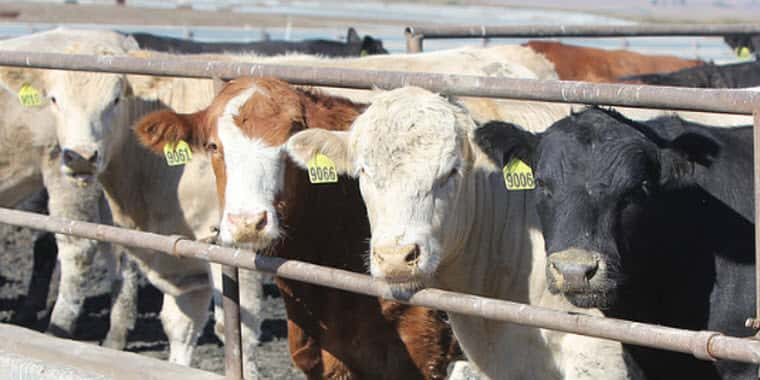
Agricultural News
R-CALF USA's Bill Bullard Calls APHIS EID Tag Plan Wrongheaded
Fri, 20 Jan 2023 04:05:00 CST
 On Thursday, the U.S. Department of Agriculture (USDA) Animal and Plant Health Protection Service (APHIS) published a proposed rule to require adult cattle shipped interstate to bear a radio frequency identification eartag. Though APHIS has changed its terminology from radio frequency identification (RFID) eartags to electronic identification (EID) eartags, it acknowledges that “the only official electronically readable identification tags are RFID tags.”
On Thursday, the U.S. Department of Agriculture (USDA) Animal and Plant Health Protection Service (APHIS) published a proposed rule to require adult cattle shipped interstate to bear a radio frequency identification eartag. Though APHIS has changed its terminology from radio frequency identification (RFID) eartags to electronic identification (EID) eartags, it acknowledges that “the only official electronically readable identification tags are RFID tags.”
“The proposed rule is a proposal to mandate the use of RFID eartags when adult cattle are shipped across state lines, period,” said R-CALF USA CEO Bill Bullard.
According to Bullard, the Regulatory Impact Analysis that accompanies the proposed RFID rule reveals a primary, if not the primary, reason APHIS persists in its efforts to mandate RFID eartags.
In support of its RFID mandate, the analysis asserts that if restrictions on U.S. beef exports are imposed, then domestic markets can be flooded with products that were intended for foreign markets and this increased supply will lower domestic prices and producers’ profits.
APHIS then cites the 2003 restrictions placed on U.S. beef exports following the discovery of an imported Canadian cow in the U.S. with bovine spongiform encephalopathy (BSE) or mad cow disease. The agency states that the resulting restrictions on U.S. beef exports caused upwards of $7.1 billion (adjusted for inflation) in losses to the “U.S. beef industry.”
“We don’t contest that the “beef industry” sustained over $7 billion in losses, but those are losses sustained by the “beef industry” – mainly the multinational beef packers – who had to pay more for U.S. cattle when those export restrictions were in place,” Bullard said.
Bullard explained that immediately following the 2003 trade restrictions, financial returns to cow/calf producers increased to historically high levels for two years in a row, due principally to the increased prices the beef packers paid for domestic cattle for several years after the restrictions were put in place.
“It’s clear the proposed RFID mandate is intended to serve the trade interests of the multinational beef packers by protecting them from having to pay higher prices for cattle as occurred following the BSE-related trade restrictions imposed in 2003.
“A government mandated RFID scheme is wrongheaded. If the multinational packers believe RFID eartags will help them avoid losses associated with trade restrictions, then those packers should offer economic incentives to the cattle industry to encourage more voluntary RFID participation.
“APHIS’ proposal is a gift to the multinational packers, granting them economic benefits that they won’t have to pay for because the proposed rule would require cattle producers to bear the cost. In addition, it’s a windfall for multinational eartag manufacturers who, by virtue of the government mandate, are guaranteed millions of dollars in eartag sales,” Bullard added.
The agency’s analysis further shows that disease traceability has improved exponentially under current law that has been in place since APHIS’ 2013 regulations that did not mandate RFID eartags and instead granted producers flexibility in choosing the type of animal identification to use when shipping adult cattle interstate.
The agency explained that after implementation of the 2013 regulations, the time each state took to trace the movement of an animal was reduced from 490 hours in 2013 to 11.5 hours in 2020, meaning it is now 42 times faster to trace a suspect animal than it was prior to the 2013 regulation. According to the agency’s chart depicting the reduced trace time, there have been year-over-year improvements each year since the current regulation has been in place.
“The agency’s own analysis demonstrates it is continually improving its disease trace-back capabilities under existing law, which is not a justification for mandating the use of high-cost RFID eartags,” Bullard commented.
In its previous Regulatory Impact Analysis, APHIS estimated the cost of tags required by the 2013 regulations based on the interstate movement of 30 million cattle per year, and the cost to producers for the metal tags authorized in that regulation was zero. In today’s proposal, the agency is estimating that only 11 million cattle would be subject to the RFID mandate, but at a cost upwards of $3.65 per eartag.
“The agency does not explain why it has reduced its estimate of cattle moving interstate by nearly a third, nor does it explain how independent cattle producers who have long suffered from depressed cattle prices can withstand upwards of a $3.65 per head increase in production costs with no expectation of recovering that cost in the marketplace.
“We are deeply disappointed in APHIS’ persistent kowtowing to multinational beef packers and multinational eartag manufactures as demonstrated by this proposed rule,” Bullard concluded.
WebReadyTM Powered by WireReady® NSI
Top Agricultural News
More Headlines...


















